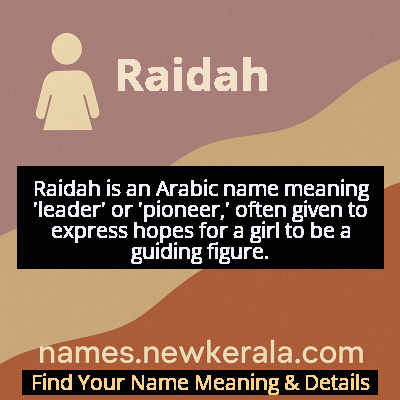Raidah Name Meaning & Details
Origin, Popularity, Numerology Analysis & Name Meaning of Raidah
Discover the origin, meaning, and cultural significance of the name RAIDAH. Delve into its historical roots and explore the lasting impact it has had on communities and traditions.
Name
Raidah
Gender
Female
Origin
Muslim
Lucky Number
5
Meaning of the Name - Raidah
Raidah is an Arabic name meaning 'leader' or 'pioneer,' often given to express hopes for a girl to be a guiding figure.
Raidah - Complete Numerology Analysis
Your Numerology Number
Based on Pythagorean Numerology System
Ruling Planet
Mercury
Positive Nature
Adventurous, dynamic, curious, and social.
Negative Traits
Restless, impatient, inconsistent, prone to indulgence.
Lucky Colours
Green, white.
Lucky Days
Wednesday.
Lucky Stones
Emerald.
Harmony Numbers
1, 3, 9.
Best Suited Professions
Sales, marketing, travel, entertainment.
What People Like About You
Versatility, charisma, adventurous spirit.
Famous People Named Raidah
Raidah Shah
Social Entrepreneur
Established women's vocational training centers across Southeast Asia
Raidah Al-Husseini
Academic Researcher
Published groundbreaking research on women in Islamic history
Raidah bint Abdullah
Historical Figure
Documented in early Islamic texts for her wisdom and community leadership
Name Variations & International Equivalents
Click on blue names to explore their detailed meanings. Gray names with will be available soon.
Cultural & Historical Significance
Extended Personality Analysis
Women named Raidah typically exhibit a unique blend of traditional warmth and modern assertiveness. They often demonstrate natural organizational skills and the ability to bring people together toward common goals. Psychologically, the name suggests someone who is both reflective and action-oriented – they consider situations carefully but are quick to implement decisions once made. Raidahs often show remarkable emotional intelligence, understanding group dynamics and individual motivations with unusual clarity. Their leadership style tends to be inclusive and mentoring rather than authoritarian, making them particularly effective in educational, community, or creative fields. Many Raidahs display a strong sense of social responsibility and often engage in volunteer work or community service. They typically balance ambition with humility, seeking to achieve not for personal glory but for the betterment of their communities. This combination of traits makes them respected figures who can navigate complex social situations while maintaining their principles and compassion.
Modern Usage & Popularity
In the 21st century, Raidah has evolved from a traditional choice to a name embraced by modern Muslim families seeking meaningful, empowering names for their daughters. Its usage has expanded beyond Arabic-speaking countries to Muslim communities worldwide, including significant popularity in Malaysia, Indonesia, Pakistan, and among Western Muslim diaspora communities. Social media and global connectivity have increased the name's visibility, with many professional women named Raidah achieving prominence in fields like technology, medicine, and academia. The name's popularity remains steady rather than trending, indicating its status as a classic choice that avoids being either overly common or obscure. Recent data from Muslim naming databases shows Raidah maintaining consistent usage across generations, suggesting it successfully bridges traditional and contemporary naming preferences. The name is particularly favored by parents who value both cultural heritage and the aspiration for their daughters to become leaders and change-makers in their chosen fields.
Symbolic & Spiritual Meanings
Beyond its literal meaning of 'leader,' Raidah carries profound symbolic weight in Islamic and cultural contexts. It represents the concept of 'Ijtihad' – independent reasoning and intellectual effort to find solutions – applied to life's journey. Symbolically, the name evokes the image of a pathfinder who not only follows established ways but creates new routes when necessary. In Sufi traditions, the name can symbolize the spiritual seeker who guides others while continuing their own journey toward enlightenment. The metaphorical meaning extends to representing resilience and adaptability – qualities essential for leadership in changing times. Raidah also symbolizes the Islamic ideal of 'Khilafah' (stewardship) applied to everyday life, suggesting responsible leadership that serves rather than dominates. The name carries connotations of light and illumination, representing someone who brings clarity and direction to complex situations. In modern symbolic terms, Raidah represents the successful integration of faith, tradition, and progressive values – making it a powerful choice for parents seeking a name with deep roots and contemporary relevance.

